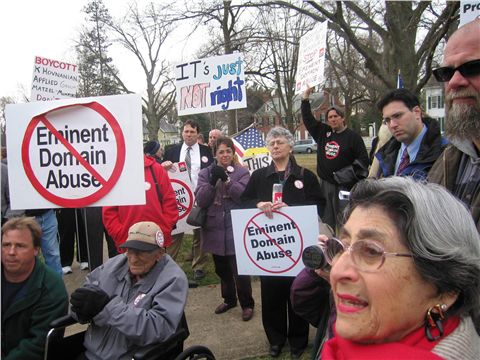Purpose
- Investigates causes tending to destroy or impair the free-market system.
Summary
Launched in 2005 in response to the U.S. Supreme Court's heartbreaking 5-4 decision in Kelo v. City of New London, the Hands Off My Home Campaign trains home and small business owners to defend their property from eminent domain abuse. As part of this campaign we assess and monitor the eminent domain situation in each state, draft model legislation, testify before legislative committees, review pending bills, generate media around legislation, and mobilize grassroots support.

October 20, 2006—Long Branch, New Jersey - Blighted Property?
Description
The goal of the Castle Coalition's Hands Off My Home campaign is to give ordinary citizens the means to defend their homes from government-forced takings for private development. We support grassroots activists nationwide, providing home and business owners with the assistance and tools they need to stop this practice and to effect substantive change to state and local eminent domain laws. In this way we fight to protect the right to private property that underpins the free-market system. The Castle Coalition is a project of the Institute for Justice.
Would you call the home above a “blighted” property? Though most Americans would agree that this home is far from a threat to public health and safety, it has nevertheless been condemned by Long Branch, New Jersey, so that the city can take the property and transfer it to another private party that wants to build high-priced condos on the prime oceanfront property. Calling perfectly normal property “blighted” is one common way that government officials use the public power of eminent domain to take homes and businesses from their owners and turn the property over to wealthy and politically connected private parties who promise to use it to generate greater tax revenue.
This abuse of the power of eminent domain, a power originally intended to allow the government to take private property for a “public use” like a road or a post office, has become increasingly common in the past 50 years, and particularly so in the wake of the U.S. Supreme Court decision in Kelo v. New London. When the Justices ruled in June 2005 that it was constitutional for the city of New London, Connecticut, to take private property and turn it over to a private developer under the guise of economic development, the floodgates were opened for local governments across the country. Emboldened by the judicial green light, governments condemned even more property for their own purposes. In the year following the decision at least 5,783 homes, businesses, places of worship, and other properties were threatened with eminent domain or condemned so that they could be transferred to other private parties.
To combat this egregious abuse of public power for private gain, the Castle Coalition launched our Hands Off My Home campaign the week following the U.S. Supreme Court ruling. As part of this campaign we assess and monitor the eminent domain situation in each state, draft model legislation, testify before legislative committees, review pending bills, generate media around legislation, and mobilize grassroots support. In just over a year we developed internal mechanisms that allow us to stay on top of and respond immediately to changes in state law and monitor the eminent domain laws in all 50 states. See http://maps.castlecoalition.org for an interactive map used by legislators, reporters, and grassroots activists nationwide.
Working with lawmakers to protect homes
Shortly after launching the Hands Off My Home campaign, the Castle Coalition developed model language that lawmakers could use to provide property owners with the greatest amount of protection. We drafted sample legislation to fit the circumstances of any state, and made it widely available via our website, where it is still available. (http://www.castlecoalition.org/legislation/index.html)
In addition to language for state moratoria, state statutes, and state constitutional amendments, we provide lawmakers with a model blight statute, which would make it harder for governments to claim that perfectly ordinary businesses and homes, like that pictured above, are “blighted” and worthy of destruction. Furthermore, our staff has already testified before legislative committees in 24 states and the U.S. Senate and House of Representatives. We also provided written testimony, statements, or briefings in 17 other states and debated or lectured on property rights in dozens of settings from television shows to university campuses.
The Castle Coalition is also currently working on a legislative “report card,” which reviews legislative efforts by each state to reform their eminent domain laws since the Kelo decision. States that have not passed anything received an “F” and the rest of the states received a grade (from A to D-) based on the strength of the legislation. The report, which makes it clear which states need further reform, will be available online by the end of March, and the Castle Coalition will distribute it to legislators, state-based think tanks and activist organizations, and the media.
Generating media
Our media campaign generated coverage in states when bills were being debated as well as nationally. Various components of the Hands Off My Home campaign have already been featured in USA Today, The New York Times, The Washington Times, The Wall Street Journal, The Washington Post, Newsweek, Fox News, CBS Evening News, and CNN, as well as a host of local news outlets. Furthermore, this summer Parade magazine profiled the Castle Coalition’s work and our activists, reaching 38 million readers with its cover story about the dangers of eminent domain abuse. In fact, our media campaign was so successful that it is featured as a case study in the latest edition of The Practice of Public Relations, the most widely used collegiate text on the subject.
We have also written and released ten publications about eminent domain abuse, from our study documenting more than 10,000 instances of eminent domain abuse in just a five-year period to our survival guide for activists to our report debunking common myths that municipalities and developers often advance in defense of the government’s use of this power for private commercial development. All these publications are available at http://www.castlecoalition.org/publications/index.html. We make every effort to leverage these studies by reaching out to a variety of people. For example, we sent our most recent publication, "Eminent Domain and African Americans: What is the Price of the Commons?", to a dozen other organizations, 3,000 media contacts, and scores of other supporters of eminent domain reform. We also worked with the study’s author, Dr. Mindy Fullilove, on a 700-word op-ed for a national newspaper to reach an even broader audience.
Mobilizing grassroots support
The concerted efforts of the Castle Coalition and its over 5,500 members nationwide have helped save numerous homes from the wrecking ball. For instance, Castle Coalition-trained activists recently defeated projects in Hollywood, California; Cheektowaga, New York; Sunset Hills, Missouri; and Ardmore, Pennsylvania. Furthermore, we have seen great success in our efforts to encourage activists to work to reform state laws—including the reforms approved by voters in the November 2006 election, so far a total of 34 states have enacted laws curbing the abuse of eminent domain for private use.
We also formed a national coalition of allies that includes the NAACP, National Council of Churches, American Farm Bureau, NFIB, and the League of United Latin American Citizens. These organizations help us get out the word about the threat of eminent domain abuse and mobilize their members to take action at both the state and federal levels. Throughout the year we conduct regional training conferences for grassroots activists, as well as hold an annual national conference near our headquarters in Arlington, Virginia. We provided the 150 people who attended last summer’s national conference with the inspiration and tools they need to defeat eminent domain abuse in their own and neighboring communities. Among the topics covered at these conferences are how to build a grassroots coalition, how to take the fight beyond individual communities to state legislators, and how to work with the media. Regional training conferences have been held over the past year in Newark, Phoenix, Seattle, West Palm Beach, St. Louis, Newport Beach, and El Paso.
One of the extraordinary activists who took our words about the power of citizen activism to heart was 93-year-old Albert Viviano, a homeowner in Long Branch, New Jersey. Al was a good and absolutely determined man, who despite his age and health problems never missed an event or meeting organized to save his neighborhood. For the past three years he defended his right to spend the rest of his life in his own home and in the neighborhood he loved. As described above, the city of Long Branch has been trying to seize the homes in his neighborhood by claiming it is curing urban “blight,” though this area of Long Branch is not, and never has been, “blighted.” Al and his neighbors had to endure not only the greed of the city but also its deception when it went back on its promise to work with them to save their homes. In spite of all this, nothing could keep Al from fighting for his rights and his dream to remain where he had lived for so many years. In early February Al passed away exactly where he wanted to: sleeping in his bed, in his home. Al’s commitment and untiring dedication to his neighbors is an inspiration to all of us—it is because of people like him that we continue to work tirelessly to protect property rights.

Purpose
The work of the Castle Coalition investigates causes tending to destroy or impair the free-market system and takes steps to stop that destruction through the targeted efforts of our staff and citizens across the country. Eminent domain abuse that allows the government to transfer property from one individual to another more wealthy or politically favored individual is a grave threat to property rights nationwide, and thus to the free-market system. Without the right to private property it would not be possible to sustain this system because ownership of a home, business, or even place of worship would become meaningless in the face of the abuse of government power.
Scope
The Hands Off My Home campaign takes on eminent domain abuse across the nation by working to effect change at the federal level and in states across the country to better protect property rights. The constitutional right to private property is of national significance because it is crucial to the American dream of economic advancement and a free-market system that allows anyone to earn a living with their own small business and own their own home.
Information Dissemination
The results of our efforts, as well as news of the studies and reports we produce, are disseminated to activists, supporters, and friends through fax and e-mail. Our primary method of communication for our results, however, is through our website, www.CastleCoalition.org, which provides complete access to all our publications and findings. One of the most important goals and accomplishments of the Hands Off My Home campaign has been to develop a website that could serve as a complete resource for property owners and activists fighting eminent domain abuse. This website has become the premiere site for reporters, legislators, and everyday Americans looking for information about eminent domain abuse and property rights.
We also send updates and press releases to other organizations and members of the media, gaining coverage in local and national news outlets that further circulates our findings and results.
Project Link www.castlecoalition.org
Amount Approved$10,000.00
on 11/7/2006
(Check sent: 11/29/2006)